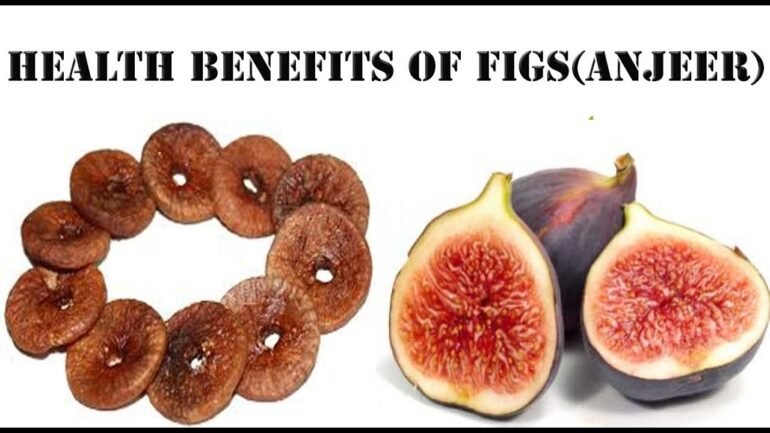Figs' nutritional value (dry)
A serving of dried figs weighing 100 grams offers:
- About 249 calories
- 3.3g of protein
- 64g of carbohydrates
- 48g of sugar (natural)
- 9.8g of fiber Fat: 0.9g
- 16% of the daily value (DV) of calcium
- 17% DV for magnesium
- Potassium: 14% DV
- 6% DV for iron
- 6% DV for vitamin B6
- Manganese and copper: abundant sources
Figs are a great source of nutrients, calcium, fiber, and antioxidants.
The Health Advantages of Figs


Preserve and Enhance Heart Health
Anjeer’s ability to strengthen the heart is one of its many noteworthy health advantages. According to studies, fig extracts may help reduce triglycerides and total cholesterol while increasing HDL (good) cholesterol. Figs can help maintain a healthier cardiovascular system by lowering blood fat levels and controlling blood pressure.
Aids in Digestion
Figs’ high fiber content serves as a prebiotic, supporting a healthy microbiome and feeding the good bacteria in your stomach. A research on people with constipation and irritable bowel syndrome (IBS) found that eating dried figs significantly reduced their symptoms. Frequent fig eating can promote overall digestive health, lower inflammation, and control bowel motions.
Lowers the Chance of Diabetes
Consuming figs as part of a healthy diet can help control blood sugar levels. Chlogenic acid, which is present in dried figs and has a moderate glycemic index (GI) of about 61, may help people with type 2 diabetes better metabolize glucose. Furthermore, fig leaf tea has demonstrated promise in lowering blood sugar levels in individuals with type 1 diabetes.
Packed with Antioxidants
Antioxidants, which are abundant in figs, help shield your body from inflammation and oxidative damage. Anjeer’s antioxidant qualities improve general health and may lower the chance of developing long-term conditions including cancer and heart disease. Your body’s antioxidant defenses can naturally be strengthened by including figs in your diet.
Aids in Weight Maintenance
Figs’ high fiber content might help you feel satiated and full, which may help you consume less calories overall. Figs can contribute significantly to a weight-loss plan by increasing satiety and enhancing metabolic health. However, because dried figs have a higher calorie density than fresh figs, it is important to eat them in moderation.
Increased Immunity
A strong immune system depends on a healthy gut flora and reduced inflammation, which are supported by the prebiotic fiber and antioxidants in figs. Figs can help boost your body’s natural defenses against illnesses by fostering the growth of good gut bacteria and combating oxidative stress.
Different Fig Types
Popular types consist of:
- Black Mission Figs: Dark, rich, and sweet.
- Kadota figs are typically consumed fresh, have green skins, and are less sweet.
- Calimyrna figs are golden and have a nutty flavor.
- Adriatic figs are frequently used in snacks and fig bars.
Methods for Eating Figs
- Eat two to three dried figs as a snack every day.
- To improve digestion, soak overnight and eat in the morning.
- Add to smoothies, oats, or cereal for morning.
- Use in sweets, energy bars, and baking.
- Combine with walnuts and almonds for a nutritious snack.
Concluding remarks
Figs are a nutritional powerhouse in addition to being delicious. Figs are an amazing dry fruit that can help with digestion, bone strength, and energy levels. Consuming two to three dried figs every day can help you stay healthy naturally and supply vital nutrients.
With good reason, figs (Anjeer) are referred to be “the fruit of longevity and wellness.”


